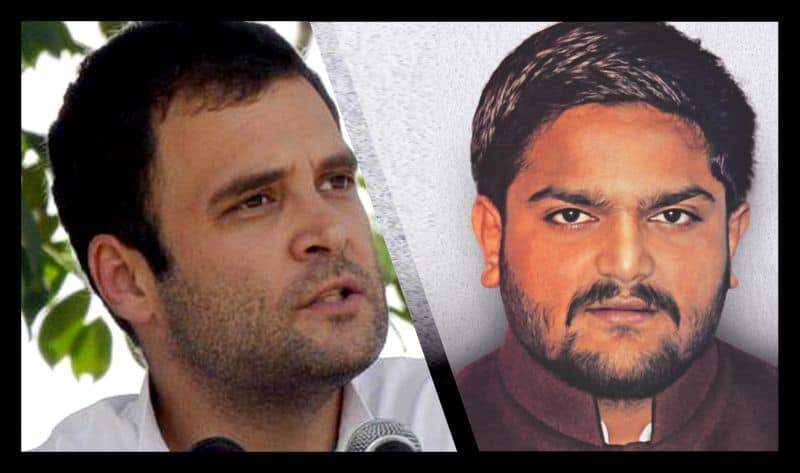By RAJEEV KHANNA for Catch News
The Congress party has reportedly come up with a three-point formula to address the contentious issue of reservation for the Patidars or Patels in Gujarat. The formula was conveyed to the Patidar Anamat Andolan Samiti (PAAS) by senior Congress leader and legal expert Kapil Sibal in a late night meeting that ended at around 3 am on Friday.
Sources in the PAAS leadership said that while the details of matter are being kept confidential, they would be taking up the Congress formula with the community leaders of Khodaldham Trust and Umiya Mata Trust that represent the two segments of Kaduva and Leuva Patels in the state. Another round of talks on the issue is expected after a couple of days.
“I cannot divulge much but the formula being worked out is such that it would stand the legal scrutiny in both the Gujarat High Court and the Supreme Court. It would be a legal recourse through the state Assembly to the Rashtrapati Bhawan,” disclosed a community member who was part of the discussions with Sibal on Thursday night.
The moot issue being debated and discussed among the political observers is how would the Congress make this reservation feasible? Observers say that there are three routes of granting reservation to a community. The first is through the Economically Backward Caste (EBC) route, the second is through the Other Backward Castes (OBC) route and the third is taking the route of the Ninth Schedule of the Constitution. Neither of them can be made applicable immediately.
“The Gujarat government had tried the EBC route which fell in the state High Court. This leaves two other routes. The OBC route would involve the Patels having to prove their backwardness. This would involve constitution of a commission that would first see whether there are grounds for such reservation for the Patels and then carry out a detailed survey. Till now, the Patels have desisted from this path. They wanted that the community be given reservation benefits without any such procedure. Now this is something like Muslims in the state seeking separate exclusive constituencies which is simply not possible,” pointed a senior media person who has been covering the legal affairs for more than a decade.
Now this leaves the third route available of getting inclusion under the Ninth Schedule. This route is easier said than done. Sources said that to include the state law in the Ninth Schedule of the Constitution, a Constitution Amendment Bill will be required to be introduced by the central government in the Parliament and passed in both the Houses by a special majority – which is by a majority of the total membership of that House and by a majority of not less than 2/3rd of the members of the House present and voting.
In addition to this, in the case of any disagreement between the two Houses, there cannot be a joint sitting of the Houses of Parliament on the Bill. This is because Article 368 of the Constitution requires each House to pass the Bill by a prescribed special majority.
The Patel leaders point out that at least the Congress leadership is showing the political will to address the concern. They say that reservation exceeding 50 per cent, as is the case in Tamil Nadu, is not being ruled out.
POLITICAL EQUATIONS
This brings into focus the political realities that prevail in the state. “There is hardly any option for the Patidars who have led the agitation against the Bharatiya Janata Party (BJP) or for the Congress. For the Patels the plain question is that if you want to show your power you have to go with a credible political force. Helping a small political entity or former chief minister and Shankersinh Vaghela’s outfit help win some seats, serves no purpose,” says veteran political analyst RK Mishra.
He pointed that the youth Patidar leader Hardik Patel and his team would support the Congress and not join it because doing so would vindicate the BJP claims that he has always been a ‘Congress agent’. Mishra feels that presenting a charter of demands at this point of time by either the Patels or the Dalits under Jignesh Mevani is nothing but ‘eyewash’ or ‘chess games’.
“This is an opportunity to indulge in a show of strength. They can show the BJP that it is because of them that the party has remained in power for so long and they can bring about a change if they feel like. There have been attempts to divide the community and even the trio of the young leaders Hardik, Mevani and the OBC leader Alpesh Thakor,” he added.
“The Patels over the last several years have been trying to convey that they are not upper castes and do not wear the ‘Janeyu’ (the sacred thread). The forthcoming polls would re-establish their place in Gujarat politics. It is still expected that the old generation will stand with the BJP that had given them prominence when the Congress had dumped the Patels for its KHAM (Kshatriya, Harijan, Adivasi and Muslim) combination. By making Keshubhai Patel the first BJP chief minister, the party had ensured a blanket support from the community. But if there is a change of guard, the community would become all powerful. If the BJP retains power, its equation with the Patel community is expected to undergo a sea change,” said an observer based in Ahmedabad.
As of now all eyes are on the details of the agreement on reservations for Patels which are likely to be finalised over the next few days.
(Courtesy: Article written by RAJEEV KHANNA for Catch News)

